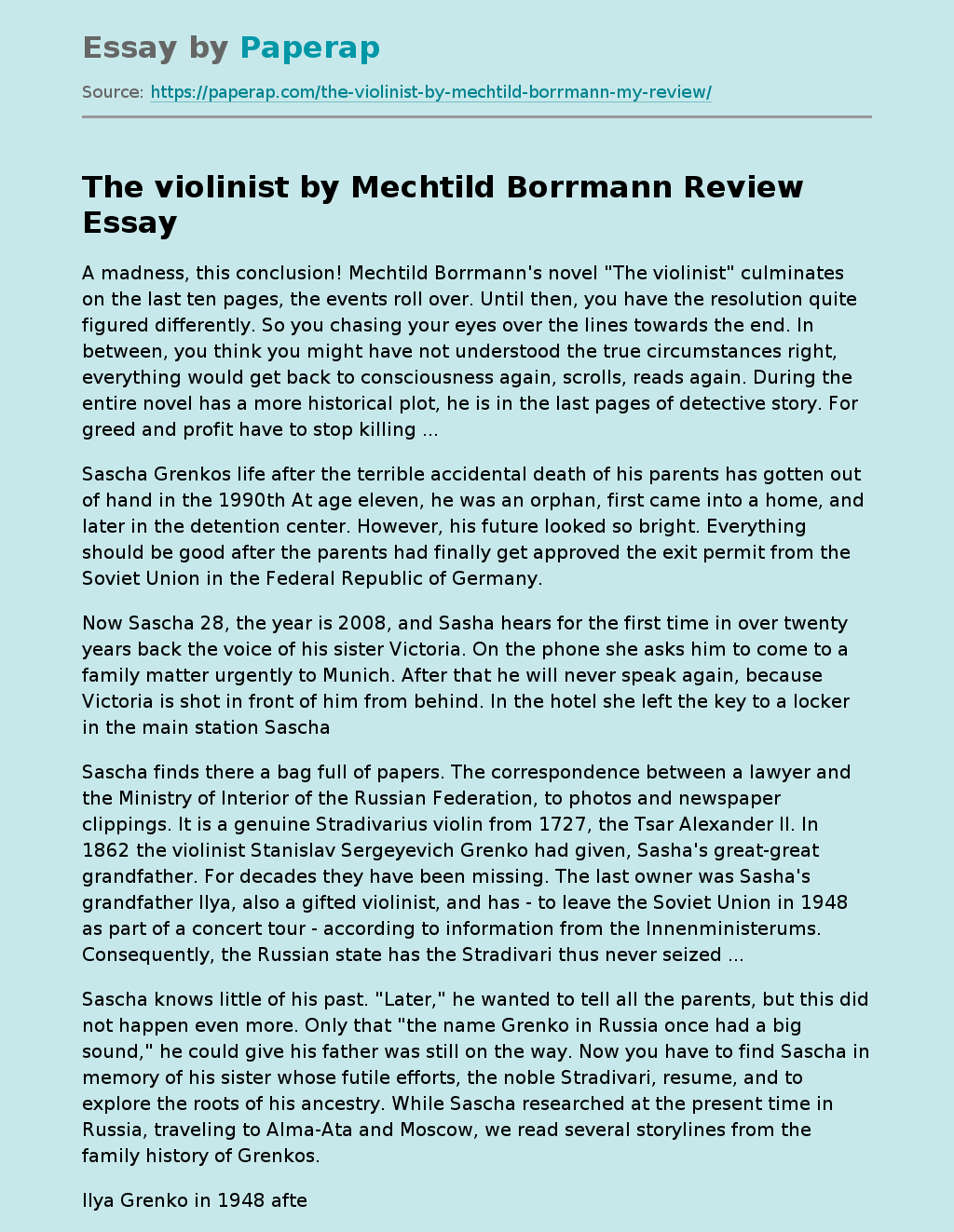The following sample essay on “The violinist by Mechtild Borrmann “: tells about the novel.
A madness, this conclusion! Mechtild Borrmann’s novel “The violinist” culminates on the last ten pages, the events roll over. Until then, you have the resolution quite figured differently. So you chasing your eyes over the lines towards the end. In between, you think you might have not understood the true circumstances right, everything would get back to consciousness again, scrolls, reads again. During the entire novel has a more historical plot, he is in the last pages of detective story.
For greed and profit have to stop killing …
Sascha Grenkos life after the terrible accidental death of his parents has gotten out of hand in the 1990th At age eleven, he was an orphan, first came into a home, and later in the detention center. However, his future looked so bright. Everything should be good after the parents had finally get approved the exit permit from the Soviet Union in the Federal Republic of Germany.
Now Sascha 28, the year is 2008, and Sasha hears for the first time in over twenty years back the voice of his sister Victoria. On the phone she asks him to come to a family matter urgently to Munich. After that he will never speak again, because Victoria is shot in front of him from behind. In the hotel she left the key to a locker in the main station Sascha
Sascha finds there a bag full of papers. The correspondence between a lawyer and the Ministry of Interior of the Russian Federation, to photos and newspaper clippings.
It is a genuine Stradivarius violin from 1727, the Tsar Alexander II. In 1862 the violinist Stanislav Sergeyevich Grenko had given, Sasha’s great-great grandfather. For decades they have been missing. The last owner was Sasha’s grandfather Ilya, also a gifted violinist, and has – to leave the Soviet Union in 1948 as part of a concert tour – according to information from the Innenministerums. Consequently, the Russian state has the Stradivari thus never seized …
Sascha knows little of his past. “Later,” he wanted to tell all the parents, but this did not happen even more. Only that “the name Grenko in Russia once had a big sound,” he could give his father was still on the way. Now you have to find Sascha in memory of his sister whose futile efforts, the noble Stradivari, resume, and to explore the roots of his ancestry. While Sascha researched at the present time in Russia, traveling to Alma-Ata and Moscow, we read several storylines from the family history of Grenkos.
Ilya Grenko in 1948 after a concert in Moscow arrested Tchaikovsky Conservatory, because you suspected he was planning to flee to the west. should in return for assurances that his family still without reprisals in Moscow live, he signed a confession. Without process is then sent him for twenty years in the Gulag after Stalingrad.
But a rather loose system of government does not feel bound by promise. It conducts its citizens with arbitrariness and uses perfidester methods. Under the bold faked excuse Ilya Grenko was a dissident and have settled in the West, his wife Galina be deprived of all civil rights, and she is banished with her two children for ten years after Kazakhstan. Great detail we read about the harrowing circumstances there: the abject misery in the wasteland, the harsh winters, the insatiable hunger, inhumane working conditions in the camp, from the hopeless lack of rights. Galina manages reasonably cope and raise their children, but over the disappointment of their lives does not come it away. That her husband had betrayed
Galina and – even more – Ilya are exemplary individual fates, the staggering odds situation be confronted again and again that they have to sacrifice themselves if they want to give the other. Experience in different ways similarities and self-abandonment-Can. Galina example, has a girlfriend who looks after the children while they toil itself must; with you share it honest give and take. Ilya makes other hand, in the forced bearing different experiences with political, criminals, officers of the Red Army. It is part of the group and responsible for their mercy. Compliance with the standards will decide on the food ration. Here “Druzhba” applies – “friendship” with agreements and debts must be paid to a Russian code of honor with strict regulations. Who can not afford more, you throw away as waste. This system deprives people of any feelings for the others and turned him into a beast. With deep shame Ilya takes the loss of his human dignity true.
“The violinist” is a touching novel about the terrible times dictatorial under Stalin’s regime, which breaks the individual by lies, indoctrination and inhuman methods and families psychologically and physically destroyed. And yet flicker even where people on the slightest need the daily struggle for survival, have been reduced still true values of friendship, trust and love as a small flame of hope in the dark.
The violinist by Mechtild Borrmann. (2019, Nov 18). Retrieved from https://paperap.com/the-violinist-by-mechtild-borrmann-my-review/

